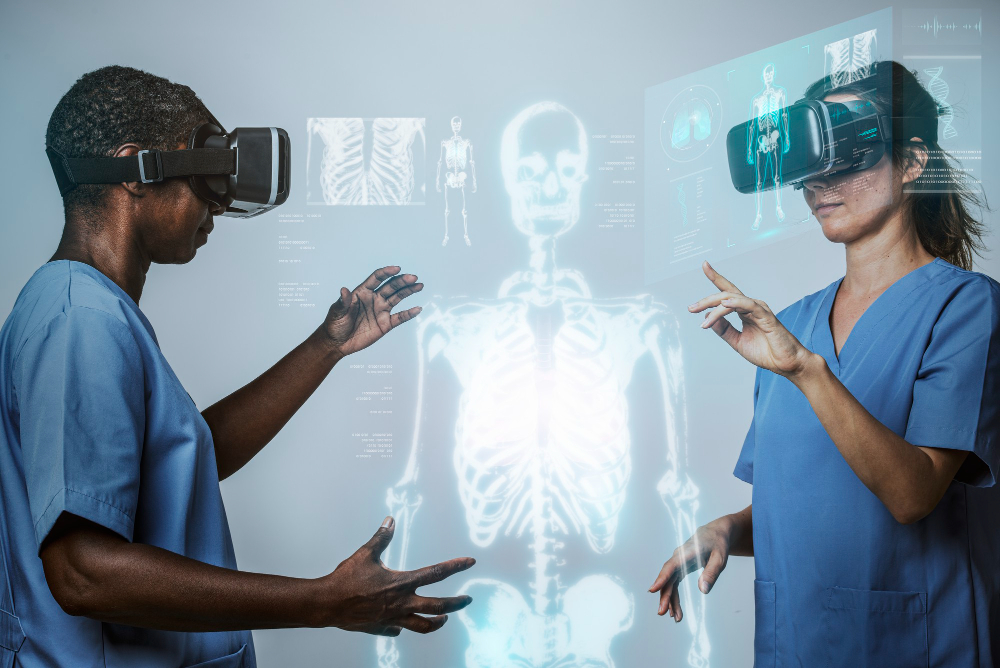This article has also been published in The Digital Health Report.
In recent years, the world has witnessed remarkable advancements in technology, and one area where it has shown great promise is healthcare.
In Africa, where healthcare resources can be scarce and healthcare challenges abound, artificial intelligence (AI) has the potential to revolutionise healthcare delivery.
This post explores four key areas where AI can enhance healthcare delivery in Africa.
We also talked about ideas for healthcare innovators in Africa.
1. Early Diagnosis And Disease Detection

AI-powered tools are becoming increasingly important in the healthcare industry as they assist medical professionals in the early diagnosis and detection of diseases.
By analysing vast amounts of patient data using machine learning, these tools can identify patterns and indicators that may go unnoticed by the human eye.
This ability to process and interpret data with precision and speed is a significant advantage in the fight against illness and disease.
For instance, AI-based image recognition systems can help radiologists detect abnormalities in X-rays, CT scans, and MRIs, leading to quicker diagnosis and timely treatment.
Idea: A doctor or healthcare professional in a rural clinic uses an AI-powered smartphone app that analyses retinal images to detect signs of diabetic retinopathy. Early detection allows the doctor or healthcare professional to organise prompt interventions, preventing vision loss in the patient.
Read more:
- A deep learning system for detecting diabetic retinopathy across the disease spectrum
- Automated diabetic retinopathy detection in smartphone-based fundus photography using artificial intelligence
2. Personalised Treatment Plans

Every patient is unique, and personalised treatment plans are essential for improving health outcomes.
The one-size-fits-all approach in healthcare is gradually ending as research has found over the years that treatment outcomes significantly depend on the individual experience, background and other related factors.
With the aid of AI algorithms, healthcare professionals in Africa can design personalised treatment plans for patients and clients. They can determine the best treatments, medications and therapy each patient needs according to their unique experiences, medical history and genetic makeup while taking the patient along and allowing them to contribute to their care.
In Africa, where there’s already a strain on the healthcare systems, patients don’t always enjoy the full attention of healthcare professionals, especially in public healthcare systems.
This lack of attention poses a significant health risk, as healthcare professionals won’t have the time to thoroughly go through each patient’s medical record and pick out patterns that can be used to design tailored-fit healthcare plans for each patient or even have time to carry the patient along in their care plan or process.
This is where AI comes into the picture.
AI algorithms can use machine learning to analyse patient data and develop tailored plans for each patient according to their experience, past treatment, and medical history.
Personalised treatment plans may seem like an advanced concept in Africa, especially since basic digital health technologies are not being effectively deployed or implemented. However, It is worthwhile to consider the possibilities and how they can strengthen healthcare systems in our communities by lifting the burden off the shoulders of healthcare professionals and improving patient outcomes.
Idea: A diabetic nurse or endocrinologist uses an AI-based decision support system to create personalised diabetes management plans for patients. The algorithm considers factors such as age, lifestyle, and blood glucose levels to recommend the most suitable dietary and exercise regimens.
Read more:
3. Remote Patient Monitoring

In Africa, access to healthcare facilities can be challenging for many patients, particularly those residing in remote areas or staying far away from tertiary healthcare facilities.
AI-powered remote patient monitoring devices can bridge this gap and enable healthcare professionals to track their patient’s health status from a distance in real time.
These devices (wearables) can collect real-time data like blood pressure, heart rate, and ECG rhythms, helping healthcare providers/professionals make informed decisions quickly without requiring the patient to visit the hospital.
Most visits to the hospital are unnecessary. Patients waste their time, resources and the healthcare organisation’s time and resources.
With the aid of AI & machine learning, remote patient monitoring systems can be designed that will monitor patients, especially vulnerable patients (elderly, pregnant mothers, young patients and those undergoing cancer care).
Idea: A community health worker uses a wearable AI-enabled device to remotely monitor the blood pressure and heart rate of elderly patients in a rural village. If any anomalies are detected, the device sends alerts to the healthcare professional, who can arrange for the patient to visit the hospital.
Read more:
4. AI for Health Education and Awareness

Health education is an essential aspect of public health.
If we’ve more people who know how to take care of themselves and when to seek help, we’ll be able to control the number of people affected by certain preventable illnesses.
Preventive healthcare is anchored on proper health education and awareness.
With the advent of social media and the internet, educating people about their health has been easy.
More Africans now use smartphones and are connected to the internet; this is an opportunity healthcare innovators can leverage to reach more people with proper health education, and AI can be used to augment and make health education more effective.
Chatbots, for instance, can engage with users, answering their health-related queries and providing accurate information.
AI-driven applications can also deliver health tips and reminders, promoting healthy behaviours and preventive measures.
Idea: A health clinic implements an AI-powered chatbot on its website and social media platforms to interact with the local community. The chatbot answers questions about common illnesses, vaccination schedules, and hygiene practices, helping raise health awareness.
Artificial Intelligence Holds Tremendous Potential for Transforming and Improving Healthcare In Africa
By embracing AI-powered tools, healthcare professionals can significantly augment care delivery and improve patient outcomes.
From early diagnosis and personalised treatment plans to remote patient monitoring and health education, AI can bridge the gap in healthcare access and enhance the overall quality of healthcare in Africa.
Nevertheless, Africa must embrace AI and make it easy for AI technologies to thrive, grow and benefit the people.
There sure is still a lot of work to be done regarding the use of AI in Africa’s healthcare ecosystem.
There are also apparent challenges that plague the continent. From political issues, problems with infrastructure and other deep-seated challenges.
But there’s no denying the truth that there’s opportunity in Africa.
In the next edition, we’ll look at some African healthcare startups leveraging AI to improve healthcare delivery.
You don’t want to miss it, as we’ll be sharing a lot of insights and strategies for healthcare innovators in Africa.
Further reading:
Joining our upcoming “Maiden Healthcare Leadership And Innovation Webinar” on January 18th. It’s free, and we will be exploring the role of artificial intelligence in expanding access to quality, safe and affordable care in Africa. You don’t want to miss it for anything. If you’re a healthcare professional interested in artificial intelligence in healthcare, this is the right way and place to start. Happily, we’re focusing on AI in healthcare throughout January.
Register here and invite colleagues and friends.





